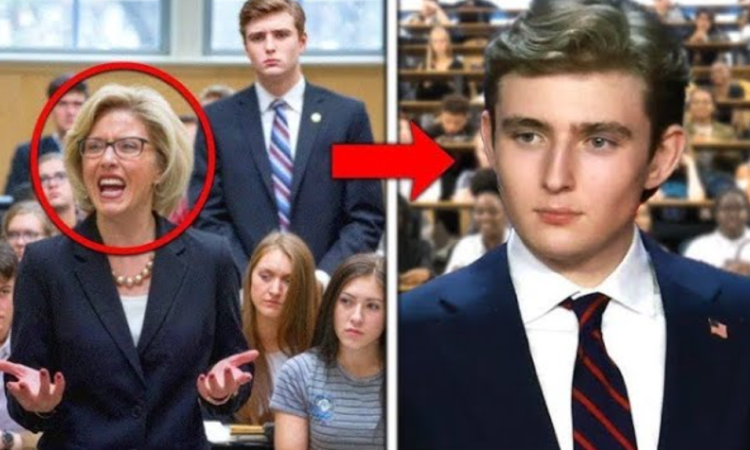Liberal Professor MOCKS Melania Trump in Front of BARRON – His Response Leaves Everyone Speechless!

Baron Trump has always been “The Quiet One,” the youngest in a family that’s constantly in the spotlight. But what happened in the lecture hall at Whitmore University stunned everyone in the moment—and is now sparking conversations far beyond campus.
It was a typical Tuesday morning at Whitmore University, nestled in the serene heart of Oregon. Students shuffled into Room 305 for a Cultural Criticism lecture taught by none other than Professor Elanar Grayson—known for her sharp wit and unflinching critiques.
Grayson was a woman who commanded attention and often controversy.
Among the sea of eager faces sat a young man, tall and poised, wearing a simple hoodie and jeans. No one in the room knew this unassuming student was Baron Trump, son of former President Donald Trump, enrolled under a pseudonym to escape the weight of his famous name. Baron had sought an environment where he could think freely and be judged for his mind, not his lineage.
But by the end of that lecture, Baron Trump would become the name on everyone’s lips.
Professor Grayson began the class with her signature energy, diving into a lecture about public image and the power of perception. She dissected the personas of public figures, using them as examples to illustrate societal hypocrisies. Then, she introduced a name that made Baron sit up a little straighter.
“Take Melania Trump, for instance,” Grayson said, her voice sharp with sarcasm. “A woman celebrated for her elegance and poise. But what does that say about our values? About beauty and silence—the qualities we want to uphold as virtues?”
The lecture hall buzzed with laughter and murmurs. Grayson pressed on, turning her critique into a takedown of Melania Trump’s public image. She mocked Melania’s “Be Best” initiative, questioned her contributions, and dismissed her as a relic of outdated societal ideals.
Baron, sitting in the third row, felt the weight of every word.
Typically reserved, Baron decided this was not a moment for silence. He raised his hand.
The room fell still.
Grayson paused mid-sentence, her sharp gaze locking onto him. “Yes?” she asked, her tone curt.
Baron stood, his movement deliberate. His voice—calm but firm—cut through the tension.
“You talk about my mother as if she’s just an image, a caricature of what society wants her to be. But have you ever stopped to consider the humanity behind the headlines?”
The room was silent, every student hanging on his words.
Baron continued, describing his mother’s journey—from a small town in Slovenia to becoming the First Lady of the United States. He spoke of her quiet strength, her intelligence, and the relentless judgment she endured.
“Maybe the problem isn’t her,” Baron said, his voice unwavering. “Maybe it’s how we, as a society, decide what’s worth celebrating.”
His words stunned the room.
Even Professor Grayson, known for her quick retorts, was momentarily speechless. When she finally responded, her tone was more measured.
“Those are compelling points,” she admitted.
But Baron wasn’t finished.
“It’s easy to judge someone based on what you see from the outside,” he said. “But it’s harder to understand their full story. Criticism is fair. But what you’re doing isn’t scrutiny—it’s mockery.”
The room erupted into applause.
For the first time, the students saw not just a quiet classmate, but someone who carried the weight of extraordinary experiences—and the courage to speak up.
By the end of the lecture, the dynamic had shifted. Grayson, visibly contemplative, addressed the class the following week with newfound humility.
“Last week, I was challenged in a way that made me reconsider not just my arguments but my approach to teaching. For that, I owe all of you—especially one of you—my gratitude.”
Baron Trump had not only defended his mother but also transformed the conversation. His actions reminded everyone that even in disagreement, empathy and fairness matter.
A student’s recording of Baron’s response went viral on social media, captioned:
“When the quietest person in the room changes everything.”
The video sparked debates about public perception, respect, and the power of standing up for what’s right.
This moment at Whitmore University wasn’t just about a lecture.
It was a reminder to look beyond the surface—and question the way we judge others.




